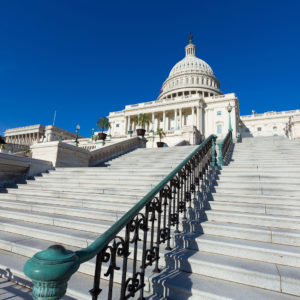Just as good ideas don’t require force, good laws don’t need to be rushed through Congress with little notice and not much debate.
Which says a lot about the rush to pass not just an extension but an expansion of the notorious Foreign Intelligence Surveillance Amendment Act. The disingenuously titled “reauthorization” legislation has been bundled with the federal spending bill currently working its way through Congress — apparently in the hope that few will notice until it’s too late to do much about it, as was done with the Affordable Care Act.
While lawmakers — and the media — are focused on dollars and cents, the FISA extension/reauthorization slouches quietly toward passage. Americans who value not just privacy but also due process and the rule of law should be more than concerned. They should be appalled.
The original FISA Act — passed in 1978 — set up protocols for law enforcement surveillance of suspected “foreign powers” and “agents of foreign powers.”
Ironically — given subsequent events — the act arose in response to public outcry over surveillance abuses uncovered during the Church/Ervin hearings that followed in the wake of the Watergate scandal. President Richard Nixon had been caught red-handed using federal law enforcement (as well as the IRS) to target political opponents under the pretext of “national security.”
The whole point of FISA was to prevent such abuses from recurring by establishing congressional and judicial oversight of surveillance activities. These included affirmation of constitutional probable cause requirements prior to the issuance of warrants for surveillance, as well as that cause be established for individual (rather than generic) suspicion.
The post-911 amendments to the 1978 FISA law — passed in the early 2000s with almost no debate and with heavy-handed suggestions that to even ask what the amendments entailed amounted to “support for terrorists” — effectively turned the original intent of FISA on its head by eliminating meaningful oversight and giving the police organs of the federal government — in particular, the National Security Agency — virtual carte blanche to do whatever they liked to whomever they liked whenever they liked.
Individual suspicion and probable cause were greatly watered down. Warrants became rubber-stamped absurdities issued upon request by the secret FISA courts. Government prosecutors simply presented their one-side cases to government judges — eliminating the protective shield of an adversarial proceeding, as required by the Constitution in all criminal proceedings.
Or at least, used to be required.
And the only record kept of these one-sided, Star Chamber-like proceedings is the number of warrants applied for and requests approved or denied.
The words of the Red Queen from Lewis Carroll’s “Alice in Wonderland” come to mind: “Sentence first! Verdict afterward!”
An open-ended, subjective and vague assertion of “terrorism” and “national security” have effectively become the sole criteria limiting what the government may do. Which amounts to next-to-no limit on what the government may do.
Soon — if the bundled extension and expansion of the FISA Act amendments are passed — there may be no meaningful limits at all.
Republican Rep. Justin Amash of Michigan and other congressional lawmakers on both sides of the aisle have written a public letter to Speaker Paul Ryan and Minority Leader Nancy Pelosi urging them to separate these new FISA proposals from the federal spending bill in order that the critical rule of law and accountability issues be publicly discussed and understood before they are passed.
The letter warns that, if enacted into law, the definition of “foreign power” and “agent of a foreign power” will be even more liberally interpreted — in the government’s favor — than is already the case. Specifically, it would no longer be necessary to present evidence that an individual or group was or is a member of a terrorist group, foreign or otherwise. Merely that they are — in the government’s words — somehow “related.”
Or — worse, from a civil liberties point of view — allegedly engaged in “malicious” activities, which could readily be construed to be just about anything the government doesn’t like, including media coverage critical of government actions.
This echoes the Alien and Sedition Acts, signed into law by President John Adams in 1789. It was used to put critics of the Adams administration in prison — and thereby inhibit others from daring to criticize the Adams administration. The Alien and Sedition Acts are rightly regarded as among the most profoundly alien and un-American laws ever imposed on the American people.
Until lately. Because this business is even shadier.
Under Section 702 of the proposed reauthorization, there is an expansion of surveillance power to include “a facility, place, premises or property” — which by implication means everything and everyone inside those facilities, places, premises and properties.
That provision alone is — or ought to be — exceptionally alarming to those concerned about civil liberties. It could easily be interpreted to mean that if one apartment in a given building houses an alleged terrorist — or merely a “malicious” individual — the entire building and everything and everyone it in are subject to surveillance.
This includes American citizens — “U.S. persons” under the law — who are nominally under the protection of the Constitution, including the Bill of Rights and specifically the Fourth and Fifth amendments.
Or rather, were.
Perhaps worst of all, the government’s loathsome practice of blanket reading Americans’ digital correspondence (emails and texts) and monitoring and recording web-browsing activities without a warrant or even the pretext of probable cause would be codified as legal henceforth — which would arguably make the U.S. government guilty of terrorism toward its own citizens.
Rep. Amish and the others who have affixed their signatures to the open letter are absolutely right. It is even more critical that the FISA “reauthorization” — unlike the Affordable Care Act — not be passed before we get to find out what’s in it.

